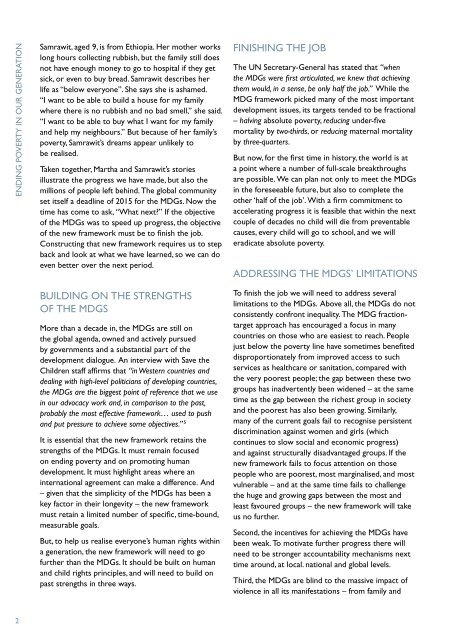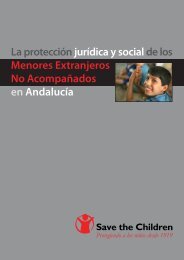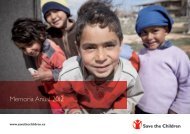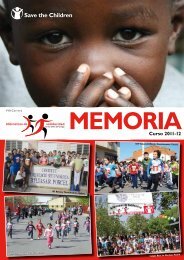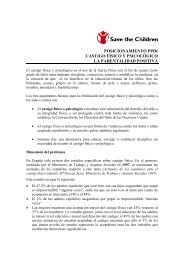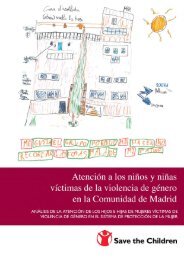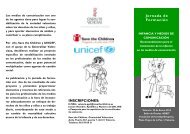ENDING poverty - Save the Children
ENDING poverty - Save the Children
ENDING poverty - Save the Children
You also want an ePaper? Increase the reach of your titles
YUMPU automatically turns print PDFs into web optimized ePapers that Google loves.
<strong>ENDING</strong> POVERTY IN OUR GENERATION<br />
Samrawit, aged 9, is from Ethiopia. Her mo<strong>the</strong>r works<br />
long hours collecting rubbish, but <strong>the</strong> family still does<br />
not have enough money to go to hospital if <strong>the</strong>y get<br />
sick, or even to buy bread. Samrawit describes her<br />
life as “below everyone”. She says she is ashamed.<br />
“I want to be able to build a house for my family<br />
where <strong>the</strong>re is no rubbish and no bad smell,” she said.<br />
“I want to be able to buy what I want for my family<br />
and help my neighbours.” But because of her family’s<br />
<strong>poverty</strong>, Samrawit’s dreams appear unlikely to<br />
be realised.<br />
Taken toge<strong>the</strong>r, Martha and Samrawit’s stories<br />
illustrate <strong>the</strong> progress we have made, but also <strong>the</strong><br />
millions of people left behind. The global community<br />
set itself a deadline of 2015 for <strong>the</strong> MDGs. Now <strong>the</strong><br />
time has come to ask, “What next?” If <strong>the</strong> objective<br />
of <strong>the</strong> MDGs was to speed up progress, <strong>the</strong> objective<br />
of <strong>the</strong> new framework must be to finish <strong>the</strong> job.<br />
Constructing that new framework requires us to step<br />
back and look at what we have learned, so we can do<br />
even better over <strong>the</strong> next period.<br />
FINISHING THE JOB<br />
The UN Secretary-General has stated that “when<br />
<strong>the</strong> MDGs were first articulated, we knew that achieving<br />
<strong>the</strong>m would, in a sense, be only half <strong>the</strong> job.” While <strong>the</strong><br />
MDG framework picked many of <strong>the</strong> most important<br />
development issues, its targets tended to be fractional<br />
– halving absolute <strong>poverty</strong>, reducing under-five<br />
mortality by two-thirds, or reducing maternal mortality<br />
by three-quarters.<br />
But now, for <strong>the</strong> first time in history, <strong>the</strong> world is at<br />
a point where a number of full-scale breakthroughs<br />
are possible. We can plan not only to meet <strong>the</strong> MDGs<br />
in <strong>the</strong> foreseeable future, but also to complete <strong>the</strong><br />
o<strong>the</strong>r ‘half of <strong>the</strong> job’. With a firm commitment to<br />
accelerating progress it is feasible that within <strong>the</strong> next<br />
couple of decades no child will die from preventable<br />
causes, every child will go to school, and we will<br />
eradicate absolute <strong>poverty</strong>.<br />
ADDRESSING THE MDGS’ LIMITATIONS<br />
BUILDING ON THE STRENGTHS<br />
OF THE MDGS<br />
More than a decade in, <strong>the</strong> MDGs are still on<br />
<strong>the</strong> global agenda, owned and actively pursued<br />
by governments and a substantial part of <strong>the</strong><br />
development dialogue. An interview with <strong>Save</strong> <strong>the</strong><br />
<strong>Children</strong> staff affirms that “in Western countries and<br />
dealing with high-level politicians of developing countries,<br />
<strong>the</strong> MDGs are <strong>the</strong> biggest point of reference that we use<br />
in our advocacy work and, in comparison to <strong>the</strong> past,<br />
probably <strong>the</strong> most effective framework… used to push<br />
and put pressure to achieve some objectives.” 5<br />
It is essential that <strong>the</strong> new framework retains <strong>the</strong><br />
strengths of <strong>the</strong> MDGs. It must remain focused<br />
on ending <strong>poverty</strong> and on promoting human<br />
development. It must highlight areas where an<br />
international agreement can make a difference. And<br />
– given that <strong>the</strong> simplicity of <strong>the</strong> MDGs has been a<br />
key factor in <strong>the</strong>ir longevity – <strong>the</strong> new framework<br />
must retain a limited number of specific, time-bound,<br />
measurable goals.<br />
But, to help us realise everyone’s human rights within<br />
a generation, <strong>the</strong> new framework will need to go<br />
fur<strong>the</strong>r than <strong>the</strong> MDGs. It should be built on human<br />
and child rights principles, and will need to build on<br />
past strengths in three ways.<br />
To finish <strong>the</strong> job we will need to address several<br />
limitations to <strong>the</strong> MDGs. Above all, <strong>the</strong> MDGs do not<br />
consistently confront inequality. The MDG fractiontarget<br />
approach has encouraged a focus in many<br />
countries on those who are easiest to reach. People<br />
just below <strong>the</strong> <strong>poverty</strong> line have sometimes benefited<br />
disproportionately from improved access to such<br />
services as healthcare or sanitation, compared with<br />
<strong>the</strong> very poorest people; <strong>the</strong> gap between <strong>the</strong>se two<br />
groups has inadvertently been widened – at <strong>the</strong> same<br />
time as <strong>the</strong> gap between <strong>the</strong> richest group in society<br />
and <strong>the</strong> poorest has also been growing. Similarly,<br />
many of <strong>the</strong> current goals fail to recognise persistent<br />
discrimination against women and girls (which<br />
continues to slow social and economic progress)<br />
and against structurally disadvantaged groups. If <strong>the</strong><br />
new framework fails to focus attention on those<br />
people who are poorest, most marginalised, and most<br />
vulnerable – and at <strong>the</strong> same time fails to challenge<br />
<strong>the</strong> huge and growing gaps between <strong>the</strong> most and<br />
least favoured groups – <strong>the</strong> new framework will take<br />
us no fur<strong>the</strong>r.<br />
Second, <strong>the</strong> incentives for achieving <strong>the</strong> MDGs have<br />
been weak. To motivate fur<strong>the</strong>r progress <strong>the</strong>re will<br />
need to be stronger accountability mechanisms next<br />
time around, at local. national and global levels.<br />
Third, <strong>the</strong> MDGs are blind to <strong>the</strong> massive impact of<br />
violence in all its manifestations – from family and<br />
2


